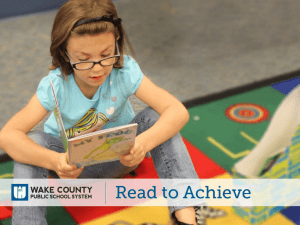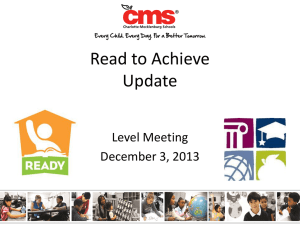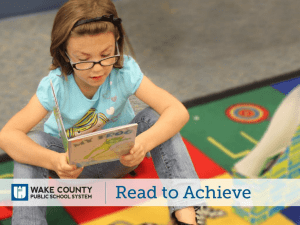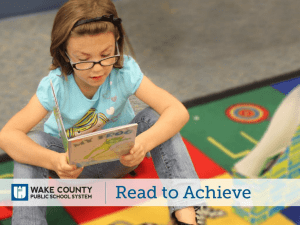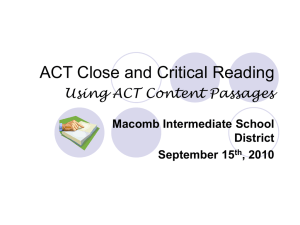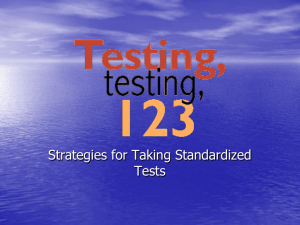the PowerPoint - Lacy Elementary School, Raleigh, NC
advertisement
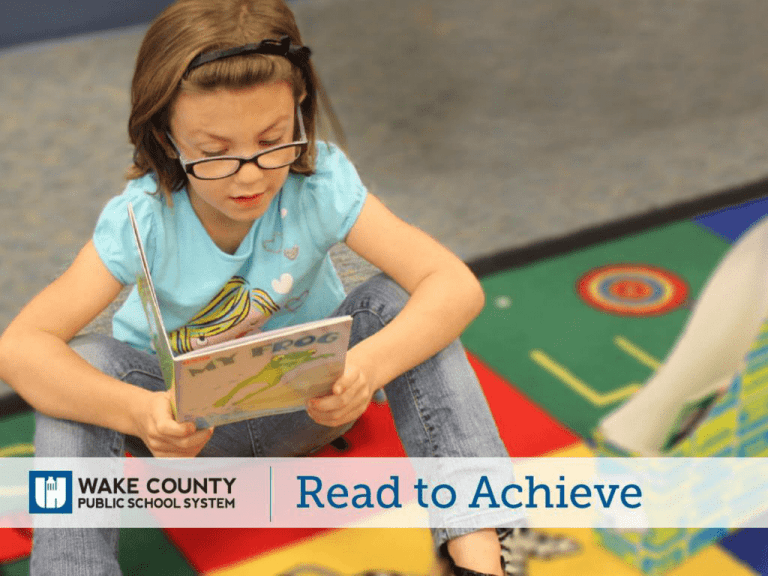
The Read to Achieve program is part of The Excellent Public Schools Act of N.C (NC House Bill 950) which became law in July 2012. Excellent Public Schools Act § 115C-83.1A. State goal. The goal of the State is to ensure that every student read at or above grade level by the end of third grade and continue to progress in reading proficiency so that he or she can read, comprehend, integrate, and apply complex texts needed for secondary education and career success. Aims of Read to Achieve • Students having difficulty developing as readers are identified as early as possible •Students receive appropriate instructional and support services to address difficulty with reading development and to remediate reading deficiencies The law outlines that if a 3rd grader is not reading at grade level by the end of 3rd grade, they will have to either repeat the third grade or attend reading camp. Key Questions To Address • Why has the state implemented the Read to Achieve Law? (Mr. Grant) • What steps are being taken at school to get your 3rd grader reading at or above grade level? (Mrs. Longo) • What are the components of the Program and what will happen if your child isn’t reading at grade level? (Mr. Grant and Ms. Warwick) • How can you help your child with his or her reading and reduce stress? (Mrs. Longo and Mrs. Bunn) TRADITIONAL CALENDAR STUDENTS Why has the state implemented the Read to Achieve Law? Reading Problems and Dropout • A student who can’t read on grade level by 3rd grade is 4 times less likely to graduate by age 19 than a child who reads proficiently by that time. Add POVERTY to the mix, and a student is 13 times less likely to graduate on time. • Students who did not read proficiently at 3rd grade constitute 88% of those who did not earn a HS diploma. Reading Problems and Dropout •Low reading skills in 3rd grade are a stronger predictor of dropping out of school than having spent at least one year in poverty. Donald J. Hernandez: “Double Jeopardy: How Third-Grade Reading Skills and Poverty Influence High School Graduation.” Annie E. Casey Foundation, 2011 TRADITIONAL CALENDAR STUDENTS What Steps Are Being Taken to Get Your Third Grader At or Above Grade Level? Growing and Supporting Readers At Lacy What do we currently have in place that addresses these efforts? Literacy Support • Classroom teachers provided differentiated reading instruction daily to students in grades K-5 • K-1 literacy specialist, Mrs. Blomquist, provides targeted, pull out support • Sally Moody, Wilson Reading specialist funded by the Lacy Foundation, provides intensive reading instruction for students in grades 2-4 • Beth Schetter, intervention teacher, provides literacy and math support for grades 3-5 • Response to Intervention process identifies students struggling in reading (as well as math) and establishes interventions and progress monitoring • Y Learning program provides daily after school instruction and home work support for What steps are being taken to get your 3rd grader reading at grade level? We are gathering information on your child’s progress. Your child’s teacher will continue to observe and monitor their progress. Your child, if not exempt, can take up to 3 passages per week. Passages are aligned to specific standards your child needs to master. These assessments include mCLASS and CASE 21, along with the EOG. What steps are being taken to get your 3rd grader reading at grade level? We are sharing information on your child’s progress. Lacy staff will talk about this specifically during conferences, emails, or reports home. 3rd grade teachers will share standards and scores. You will get formal reports, including the Home Connect letter. What steps are being taken to get your 3rd grader reading at grade level? We are sharing information on your child’s progress. TRADITIONAL CALENDAR STUDENTS What Are the Components of the Read to Achieve Program and What Happens if Your Child Isn’t Reading At Grade Level? TRADITIONAL CALENDAR STUDENTS Good Cause Exemptions Students may be exempt from mandatory retention in third grade for good cause but shall continue to receive instructional supports and services and reading interventions appropriate for their age and reading level . Good cause exemptions shall be limited to the following: • Limited English Proficient students with less than two years of instruction in an English as a Second Language program •Students with a BOG score 442 or higher •Students who have a reading TRC score level P or higher •Students with disabilities on the extended Common Core. These students are in self-contained classrooms and not on a graduation track for a full diploma. It is possible students taking the Extend 1 assessment, a modified EOG, may be exempt from the reading passages. TRADITIONAL CALENDAR STUDENTS Good Cause Exemptions •Students who score a 3- or higher on 1st, 2nd, or 3rd quarter Case21 assessment •. Students with disabilities who take the Extend 2 assessment • Students who demonstrate, through a student reading portfolio, reading proficiency appropriate for third grade students •Students who have previously been retained more than once in kindergarten, first, second, or third grades TRADITIONAL CALENDAR STUDENTS How will the State determine that your child is reading at grade level? Did your child pass the reading section of the End of Year Reading EOG? Yes. Your child moves to the 4th grade. No. Your child’s teacher will look at: Results of portfolio • mCLASS • PEP (if applicable) • Reading passages -or- Read to Achieve Test TRADITIONAL CALENDAR STUDENTS How will the State determine that your child is reading at grade level? Does your child have a successful portfolio or did they pass the Read to Achieve Test? Yes. Your child moves to the 4th grade. No. It will be determined that your child is not reading at grade level. Your child will be enrolled in a free, districtsponsored reading camp. TRADITIONAL CALENDAR STUDENTS If your child is determined to be reading below grade level, you have two choices: Attend Camp Decline Camp • Your child be enrolled in a free, district-sponsored reading camp. • Your child will repeat the 3rd grade. • Your child will receive additional instruction and support in reading. • Reading camp is scheduled for 6 weeks during the summer break. • The law does not allow us to grant exceptions. TRADITIONAL CALENDAR STUDENTS When attending Camp • Your child will be retested at the end of camp and move into the 4th grade. • Children who are still not reading at grade level will have a ‘retention label’ and receive additional support in 4th grade. • The retention label will be removed if the child demonstrates proficiency by mid-year of 4th grade. TRADITIONAL CALENDAR STUDENTS Summer Reading Camp •Runs for 6 weeks: June 16, June 23, July 10, July 14, July 21, July 28 •4 days a week, M-TR for up to 6 hours a day •Only focuses on Reading Instruction and is themed based •Students who don’t demonstrate mastery will be enrolled with fourth grade peers. They will receive 90 minutes of uninterrupted reading instruction daily. Students’ progress toward evidence of mastery is tracked through the reading portfolio. •Sites not yet determined TRADITIONAL CALENDAR STUDENTS How are the passages for the Reading Portfolio going to be administered? • At this time, students who do not have an exemption are being administered the reading passages during their reading class. •Depending on the students reading class they will complete the passage as a group or as part of their Daily Café reading center rotation. •The previous week’s scores will be sent home in the Wednesday folder so parents can be informed of areas where their child needs continued support Score Sheet Standard Assessed Standard Parent Recommendations RL3.1 Ask and answer questions to demonstrate understanding of a text, referring explicitly to the text as the basis for the answers. When reading fiction or watching a movie or television show, ask your child: What is the story mainly about? What is a problem(s) that the character has to solve? How do they solve it? Find the answers to questions in the text or support thinking with details from the show. When reading fiction such as The Paper Bag Princess, Cloudy with a Chance of Meatballs, Why Mosquitos Buzz, One Grain of Rice, Arrow to the Sun: A Pueblo Indian Tale, etc., ask your child: Identify the central message (lesson or moral) of the story. How does the author share the central message (lesson or theme)? Retell the story (beginning, middle, and end) and tell what the author was trying to teach us. RL3.2 Retell stories, including fables, folktales, and myths from diverse cultures: determine the central message, lesson, or moral and explain how it is conveyed through key details in the text. Passage Scores Passage 1 _______ Passage 2 _______ Passage 3 _______ Passage 1 _______ Passage 2 _______ Passage 3 _______ How can I help my child with his or her reading and reduce stress? Read together for at least 20 minutes each day! • Parent/Teacher Communication • Home Connect Activities • Visit the library • Stay involved Resources • Wake County Website with Read to Achieve Resources http://www.wcpss.net/parents/guides/read-toachieve/index.html • Websites that support Literacy: Learnzillion Lesson Planet Jumpstart • Guidance suggestions for stress • Share “R2A Passage Parent Recommendations” sheet with list of standards and questions to ask.
